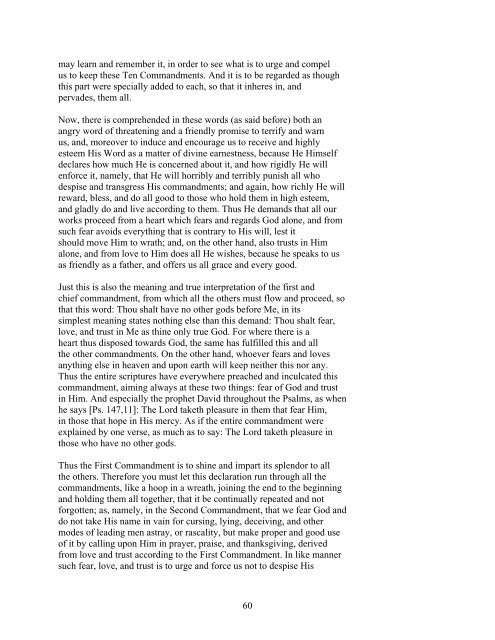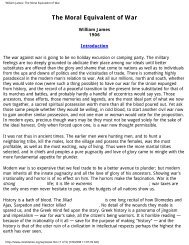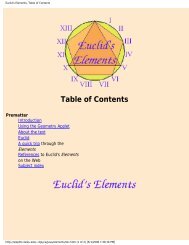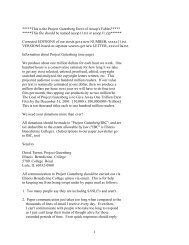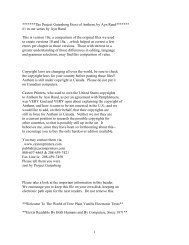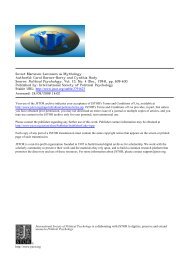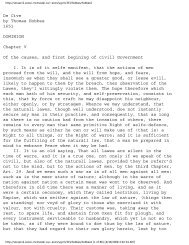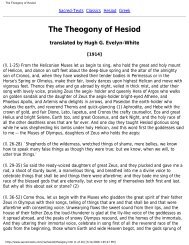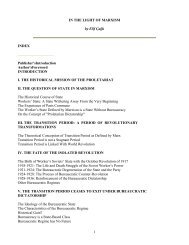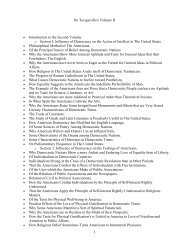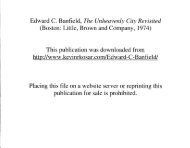Project Gutenberg Etext of The Large Catechism, by Martin Luther
Project Gutenberg Etext of The Large Catechism, by Martin Luther
Project Gutenberg Etext of The Large Catechism, by Martin Luther
Create successful ePaper yourself
Turn your PDF publications into a flip-book with our unique Google optimized e-Paper software.
may learn and remember it, in order to see what is to urge and compel<br />
us to keep these Ten Commandments. And it is to be regarded as though<br />
this part were specially added to each, so that it inheres in, and<br />
pervades, them all.<br />
Now, there is comprehended in these words (as said before) both an<br />
angry word <strong>of</strong> threatening and a friendly promise to terrify and warn<br />
us, and, moreover to induce and encourage us to receive and highly<br />
esteem His Word as a matter <strong>of</strong> divine earnestness, because He Himself<br />
declares how much He is concerned about it, and how rigidly He will<br />
enforce it, namely, that He will horribly and terribly punish all who<br />
despise and transgress His commandments; and again, how richly He will<br />
reward, bless, and do all good to those who hold them in high esteem,<br />
and gladly do and live according to them. Thus He demands that all our<br />
works proceed from a heart which fears and regards God alone, and from<br />
such fear avoids everything that is contrary to His will, lest it<br />
should move Him to wrath; and, on the other hand, also trusts in Him<br />
alone, and from love to Him does all He wishes, because he speaks to us<br />
as friendly as a father, and <strong>of</strong>fers us all grace and every good.<br />
Just this is also the meaning and true interpretation <strong>of</strong> the first and<br />
chief commandment, from which all the others must flow and proceed, so<br />
that this word: Thou shalt have no other gods before Me, in its<br />
simplest meaning states nothing else than this demand: Thou shalt fear,<br />
love, and trust in Me as thine only true God. For where there is a<br />
heart thus disposed towards God, the same has fulfilled this and all<br />
the other commandments. On the other hand, whoever fears and loves<br />
anything else in heaven and upon earth will keep neither this nor any.<br />
Thus the entire scriptures have everywhere preached and inculcated this<br />
commandment, aiming always at these two things: fear <strong>of</strong> God and trust<br />
in Him. And especially the prophet David throughout the Psalms, as when<br />
he says [Ps. 147,11]: <strong>The</strong> Lord taketh pleasure in them that fear Him,<br />
in those that hope in His mercy. As if the entire commandment were<br />
explained <strong>by</strong> one verse, as much as to say: <strong>The</strong> Lord taketh pleasure in<br />
those who have no other gods.<br />
Thus the First Commandment is to shine and impart its splendor to all<br />
the others. <strong>The</strong>refore you must let this declaration run through all the<br />
commandments, like a hoop in a wreath, joining the end to the beginning<br />
and holding them all together, that it be continually repeated and not<br />
forgotten; as, namely, in the Second Commandment, that we fear God and<br />
do not take His name in vain for cursing, lying, deceiving, and other<br />
modes <strong>of</strong> leading men astray, or rascality, but make proper and good use<br />
<strong>of</strong> it <strong>by</strong> calling upon Him in prayer, praise, and thanksgiving, derived<br />
from love and trust according to the First Commandment. In like manner<br />
such fear, love, and trust is to urge and force us not to despise His<br />
60


